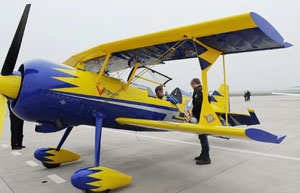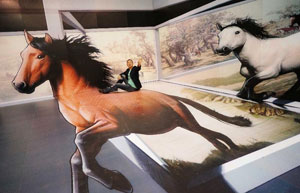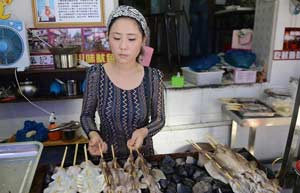

Eating the colonel's lunch
In a slowing economy, many consumers are trading down to cheaper alternatives or simply dining at home, said analysts, which has contributed to the growth rate in the wider fast food market halving over the last 5 years to 8 percent this year.
Lunch at Dicos costs less than 17 yuan ($2.80) compared with a similar offering from KFC, which costs 25 yuan ($4.11), according to Mintel.
"Local establishments generally also do a better job catering to local tastes," said Karla Wang, associate research director at market research firm TNS China. "These familiar 'comfort foods' often go a long way in soothing frazzled consumers during times of uncertainty."
Diners have even started to question international chains' quality, traditionally a strong point after scandals ranging from the use of recycled "gutter oil" for cooking to industrial chemical-laced milk made consumers wary of local products.
But a number of scares over the last year, including reports that some chicken purchased by KFC and McDonald's had been fed excess antibiotics, seems to have altered consumer views. Only one-in-four Chinese thought Western fast food has healthier and better quality than Chinese alternatives, said a recent report from research firm Mintel.
McDonald's and Yum have taken note.
"We address food quality and food safety in all aspects of our communication; most recently, we launched a Moms' Trust campaign... and we will be doing more in this area," said Jessica Lee, a Shanghai-based spokeswoman for McDonald's.
Yum officials were not immediately available for comment.
The company has trimmed its local supply chain and plans to launch a new China quality assurance campaign in November that will feature KFC employees, suppliers and poultry farmers.
"We still have work to do, but we know we are doing the right things to regain consumer trust and we remain confident that our best days for KFC in China are yet to come," Chief Executive David Novak said in an analysts call on Oct 9.
Read more at
 World's first 1-liter car debuts in Beijing
World's first 1-liter car debuts in Beijing
 Paper-made furniture lights up art show
Paper-made furniture lights up art show
 Robots kick off football match in Hefei
Robots kick off football match in Hefei
 Aerobatic team prepare for Aviation Convention
Aerobatic team prepare for Aviation Convention
 China Suzhou Electronic Manufacturer Exposition kicks off
China Suzhou Electronic Manufacturer Exposition kicks off
 'Squid beauty' and her profitable BBQ store
'Squid beauty' and her profitable BBQ store
 A day in the life of a car model
A day in the life of a car model
 Vintage cars gather in downtown Beijing
Vintage cars gather in downtown Beijing